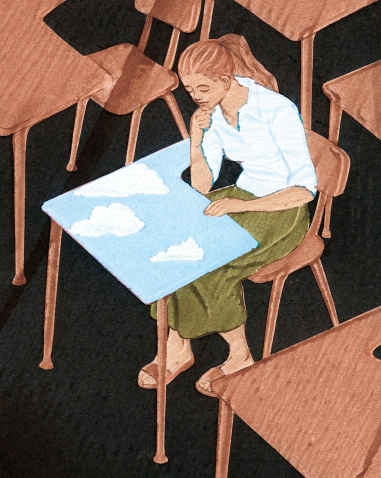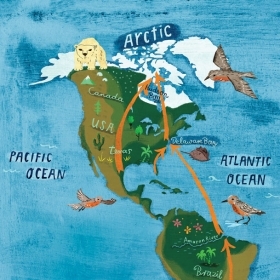My cat would not shut up. Pacing, mewing, pacing and mewing. To be fair, Bianca Marcel was a city cat, a purebred Siamese who came to me with a folder of papers documenting her lineage. And I had dragged her from Brooklyn to Nantucket that September, all told a six-hour trip that included two hours on a ferry.
Also to her credit, the one-bedroom bungalow we were staying in smelled nothing like our fifth-floor walk-up in Clinton Hill. Built in the 1800s, the house was relocated from the center of town to ’Sconset in order to accommodate larger, more attractive homes. A wooden trellis covered the roof and supported flowering vines that had all but gone by.
September is Nantucket’s off-season, but no less my favorite. Not just because people in large groups make me nervous, or because I’d loved Moby-Dick more than any 10th-grader reasonably should, but because the water bears the violence of the weather changing from summer to fall. The slow, sad death of summer puts being alive in relief, makes the ache of the waves more devastating. But let’s be honest: I went to Nantucket because I didn’t know what else to do. I left my job as a lawyer at a small firm, only six months after leaving my job as a lawyer at a large firm. I learned that the capacity and the desire to be a lawyer are different things entirely, and that I lacked the latter.
They call this the quarter-life crisis. They define crisis as a “difficult or dangerous situation that needs serious attention.” I’d spent my 27 years up to that point achieving for an imaginary audience nodding their heads in invisible approval. I had been marching in a laudatory parade leading to the big-law-firm job. My difficult and dangerous situation needed serious attention: I didn’t feel like achieving any more. Even the ocean has to obey the distant moon; how could this 27-year-old teacher’s pet break free of the lure of prestige, pantsuits in summer, a six-figure salary? I figured there was no better place for serious attention than a secluded beach.
Bianca continued her howling crisis. But my own crisis—softened by long walks and the sound of crashing waves—soon moved out of the danger zone into the literary world: It became a decisive moment in the protagonist’s plot. My then-boyfriend, with whom I had come to Nantucket, asked me what I would do if I could do anything. I answered, unhesitatingly, “Well, I would write. Obviously. Like everyone else.” And so, after much fussing with the bungalow’s shoddy internet, I signed up for several writing courses at the New School.
Back in New York, the first day of Introduction to Creative Nonfiction I was nervous (as usual). I had been an English literature major and had spent a lot of time with James Joyce. I thought the creative-writing majors were self-centered and indulgent, even disrespectful. Who gave them the right to create? They hadn’t even read everything. The conceit. The conceit with which I was soon to be enamored. Yes, yes, I know it’s predictable.
I rushed to class so I could sit immediately to the right of my professor. That semester, more than anything, I was grateful to learn that, yes, writers read. My memories of that professor, and of the long line of Wellesley professors before her, guide my evaluation of my work. I long for the checks and pluses of their approval. The imagined audience for my various achievements took shape anew in the form of Wellesley English professors. I guess the rehabilitation of a teacher’s pet takes a long time.
My professor at the New School gave me the signal I needed to become what I was most afraid of: that conceited beast, the writer. In her office, she opened the shade for us, so that while looking out on the vast cityscape we could discuss just what the hell I should do with this gift, this burden, of the need and desire to write. She taught me then that a truly great teacher encourages her students to look ever beyond her guidance, out to the world and into the self.
One year and 100 manuscript rejections later, I’m pursuing my M.F.A. in fiction at Columbia. My cat still won’t shut up, but I find a certain peace in the pacing, the mewing. The pacing and mewing. I like to think that the audience, real or imagined, approves of the happiness I found in uncertainty.
Courtney Campbell ’07 lives in Manhattan and studies fiction in Columbia’s creative-writing program. She writes about women and outcasts and mental illness. She advocates for victims of sexual assault at Bellevue Hospital. A version of this essay appeared on the website Wellesley Underground.








We ask that those who engage in Wellesley magazine's online community act with honesty, integrity, and respect. (Remember the honor code, alums?) We reserve the right to remove comments by impersonators or comments that are not civil and relevant to the subject at hand. By posting here, you are permitting Wellesley magazine to edit and republish your comment in all media. Please remember that all posts are public.